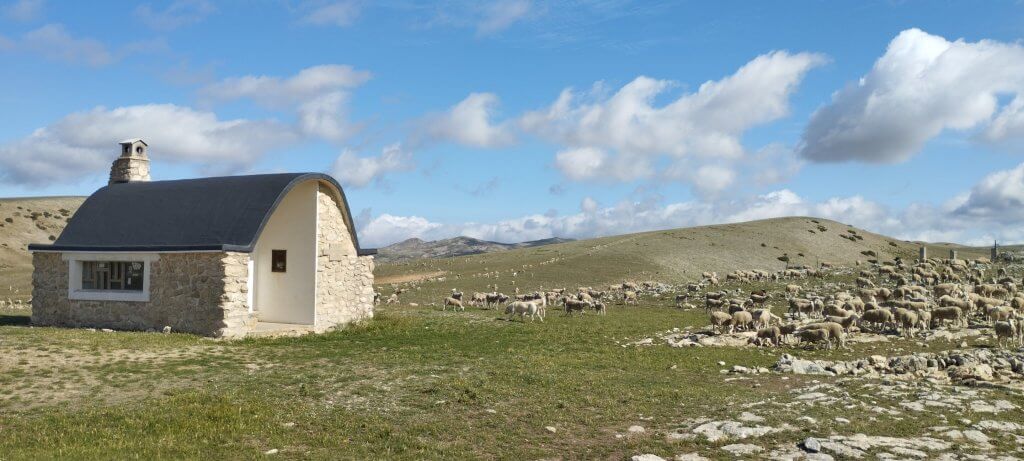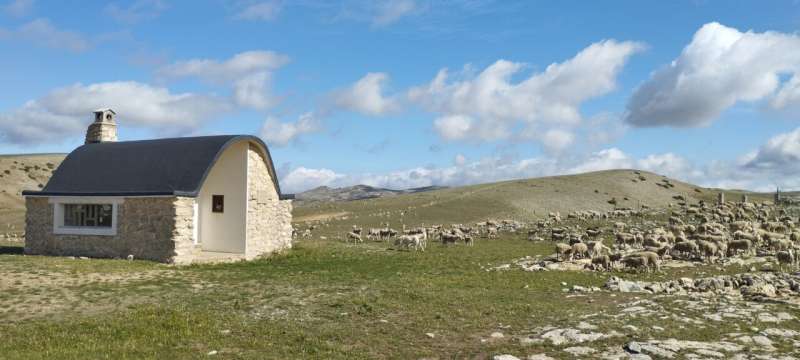
Wild and domestic ungulates are key to Mediterranean ecosystem sustainability, finds study (Image Credit: Phys.org)

Researchers from Miguel Hernández University of Elche (UMH) have conducted a vegetation analysis over the last 30 years using satellite images from two environments in the Sierra de Cazorla Natural Park (southeast Spain)—one with wild ungulates such as deer and the other predominantly with domestic ungulates specifically Segureño sheep—which concludes that these types of herbivores produce different effects on vegetation.
Wild and domestic ungulates complement each other to maintain ecosystems. Therefore, ecology experts recommend maintaining both traditional transhumant grazing and supervising abandoned agroforestry areas that are being reclaimed by nature.
The study, published in the journal Landscape Ecology, represents progress in understanding how Mediterranean ecosystems could evolve in the context of climate change.
In recent years, abandoning traditional practices, in line with climate changes, has transformed agropastoral systems in Mediterranean landscapes. As a result of this phenomenon, there is an increasingly frequent process of renaturalization and change in affected environments, known as passive rewilding.
Although this process can bring benefits such as greater climate resilience and refuge for certain wildlife species, it also entails the loss of diverse cultural landscapes and increasingly uncommon traditional uses.
To understand the future evolution of these ecosystems and discover keys that help in their conservation, it is essential to evaluate their long-term climate responses under different conditions that consider both domestic species grazing and the presence of wild ungulates.
In this context, a study conducted by researchers from the Department of Applied Biology at UMH, Marina Rincón Madroñero, José Antonio Sánchez Zapata, and Jomar M. Barbosa, along with researcher Xavier Barber from the Operations Research Center of the same university, is framed.
The scientists conducted their work in southeast Spain, in the Sierra de Cazorla, Segura y las Villas Natural Park, with a dual purpose: to evaluate the climate’s effect on landscape-scale primary productivity and to analyze long-term trends in vegetation biomass in response to passive rewilding or the maintenance of traditional grazing systems.
More specifically, two areas with very similar characteristics were analyzed, located less than 15 km apart: Los Campos de Hernán Perea, a plateau characterized by its well-preserved transhumant use, and Calar de Juana, located within the maximum reserve zone of the Natural Park.
In both enclaves, extensive livestock grazing was traditionally allowed; however, with the park’s declaration in 1986, livestock use was restricted, including in the Calar de Juana area.
In the study satellite images were used to generate time series according to the Normalized Difference Vegetation Index (NDVI), representing primary productivity and vegetation biomass of two key landscapes: one with wild ungulates and the other predominantly with domestic ungulates.
While vegetation biomass remained constant over time (30 years) in the transhumant area, with primary productivity influenced by temperature and seasonal precipitation, in areas with wild herbivory, primary productivity was mainly driven by annual rainfall, with less dependence on seasonal rains. Additionally, a secondary succession process that increased shrubland areas was detected in areas with only wild ungulates.
Among their conclusions, the authors highlight that although domestic and wild ungulates may have partial similarities in their roles in trophic interactions through plant ingestion or their influence on nutrient cycles in grazed areas, they also show significant differences in the effects they produce on vegetation.
Given this complementarity, researchers indicate the importance of maintaining both systems and evaluating transhumant landscapes as sustainable ecological management that can improve food security. They also emphasize the importance of particular attention to areas undergoing passive rewilding as refuges and habitats for other wildlife species.
Finally, the authors insist that, given the increasing frequency of extreme weather events and rising temperatures, further research is needed to address how these different landscapes will be preserved.
In this regard, the study aims to help advance the understanding of vegetation dynamics in different herbivory scenarios and within a framework of long-term climate patterns, providing information that ultimately contributes to making the best decisions regarding managing Mediterranean landscapes.
More information:
Marina Rincon-Madroñero et al, Long-term vegetation responses to climate depend on the distinctive roles of rewilding and traditional grazing systems, Landscape Ecology (2024). DOI: 10.1007/s10980-024-01806-2
Provided by
Miguel Hernandez University of Elche
Wild and domestic ungulates are key to Mediterranean ecosystem sustainability, finds study (2024, April 19)
retrieved 20 April 2024
from https://phys.org/news/2024-04-wild-domestic-ungulates-key-mediterranean.html
part may be reproduced without the written permission. The content is provided for information purposes only.





